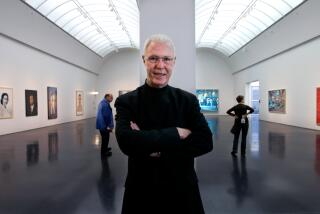Festival Fatigue
- Share via
Over the years, the Summer Solstice Festival and the Topanga Banjo Fiddle Contest have survived recessions, rap music, even the L.A. riots. But a leadership vacuum may mean the end for these two major Valley-based cultural events.
For the last 17 years, the Summer Solstice Festival was a regular event on the June calendar. Sponsored by the California Traditional Music Society, it was an annual three-day celebration of folk music and related arts. As a teaching festival, it featured as many as 300 workshops, plus performances by practitioners of various folk arts and music.
This weekend, the society will replace it with something more modest--just two concerts: a Celtic music presentation with Joe and Antoinette McKenna and Mary Bergin on Saturday and a performance by folk singer-songwriter Bill Staines on Sunday.
The reason for the scaled-back endeavor is not lack of money, participants, or fans’ interest. The truth is that Clark and Elaine Weissman, the festival’s creators and organizers, are simply tired. After 17 years, they want to retire.
“Clark and I will stay on the board,” said Elaine Weissman, “but the organization needs new blood.”
Rather than suddenly chuck it all and call it quits, they decided to scale back the operation this year, and let their successors resume the festival next year.
But that’s the problem: There are no successors.
And the Summer Solstice Festival is not the only local music event looking for new leadership.
Dorian and Dalia Keyser, the husband-and-wife team behind the annual Topanga Banjo Fiddle Contest, a Southern California musical tradition for 37 years, also want to retire, and they’ve notified the contest’s board of directors.
“We told them two years ago that we’d do it two more years.” said Dorian Keyser. As with the Weissmans, no replacements for the Keysers have been named.
“There are a lot of people who are supporters of the contest, but that’s not running it,” Keyser said. “It turns out that behind every event of this kind, there are usually one or two people who are the keepers of the flame, and it’s often hard to replace them.”
Clark Weissman, a claw-hammer banjo player, and his wife, Elaine, started the solstice festival 17 years ago in Beverly Hills, because there was nothing like it in the Los Angeles area. (In fact, there are few comparable teaching festivals anywhere in the world).
The solstice festival usually offers about 300 workshops where people can learn to play a new instrument or pick up a different style. Workshops have included Cajun accordion, hammered dulcimer, panpipe, Andean folk songs and Celtic harp.
The Weissmans contract with some of the best teachers and bring them to Los Angeles for the festival. And the festival even offers loaner instruments to novices in some classes.
Over the years, it moved from Beverly Hills to Cal State Northridge. For the last nine years, it’s been held at Soka University in Calabasas.
The Topanga Banjo Fiddle Contest started in Topanga Canyon in 1961. That year, it attracted 26 five-string banjo players, five fiddlers, four judges and about 500 other people. This year’s festival, held in May at Paramount Ranch near Agoura Hills, had over 100 contestants, plus three professional bands. It attracted over 4,000 people.
Keyser, a guitarist, started working at the contest in 1967. He and wife Dalia took over running the show from the original organizers in 1973.
It’s been a long time since the contest has been held in Topanga. Because of a 1970 Los Angeles County ordinance restricting outdoor music festivals, passed after the Stones’ deadly Altamont concert, the contest first moved to Santa Barbara, then to Santa Monica, UCLA and other locations. It’s been held at Paramount Ranch since 1990.
As part of the Keysers’ arrangement for use of the space, they produce three additional free concerts for the National Park Service at the Peter Strauss Ranch during the summer.
Under the Keysers’ leadership, the contest has expanded over the years to include dancing, folk arts, cowboy poetry and storytelling. But the banjo and fiddle competition remains the core of the event.
Both the Weissmans and the Keysers said there are people who have expressed interest in taking over the leadership reins, but no one has been selected.
What kind of person is needed to run a major folk music event?
“The person has to be creative,” Dorian Keyser said. “You have to figure out ways to make things cost-effective, and you have to be flexible.
“You need the drive and the motivation, and you have to be committed to do it for a while. You have to delegate, but, at the same time you have to know what’s going on.”
No matter how good retirement looks, the Weissmans have no regrets about their 17 years running the festival. Said Elaine, “The fact is that Clark and I have made an impact on the preservation of folk music and we did it by teaching.”
More to Read
The biggest entertainment stories
Get our big stories about Hollywood, film, television, music, arts, culture and more right in your inbox as soon as they publish.
You may occasionally receive promotional content from the Los Angeles Times.










